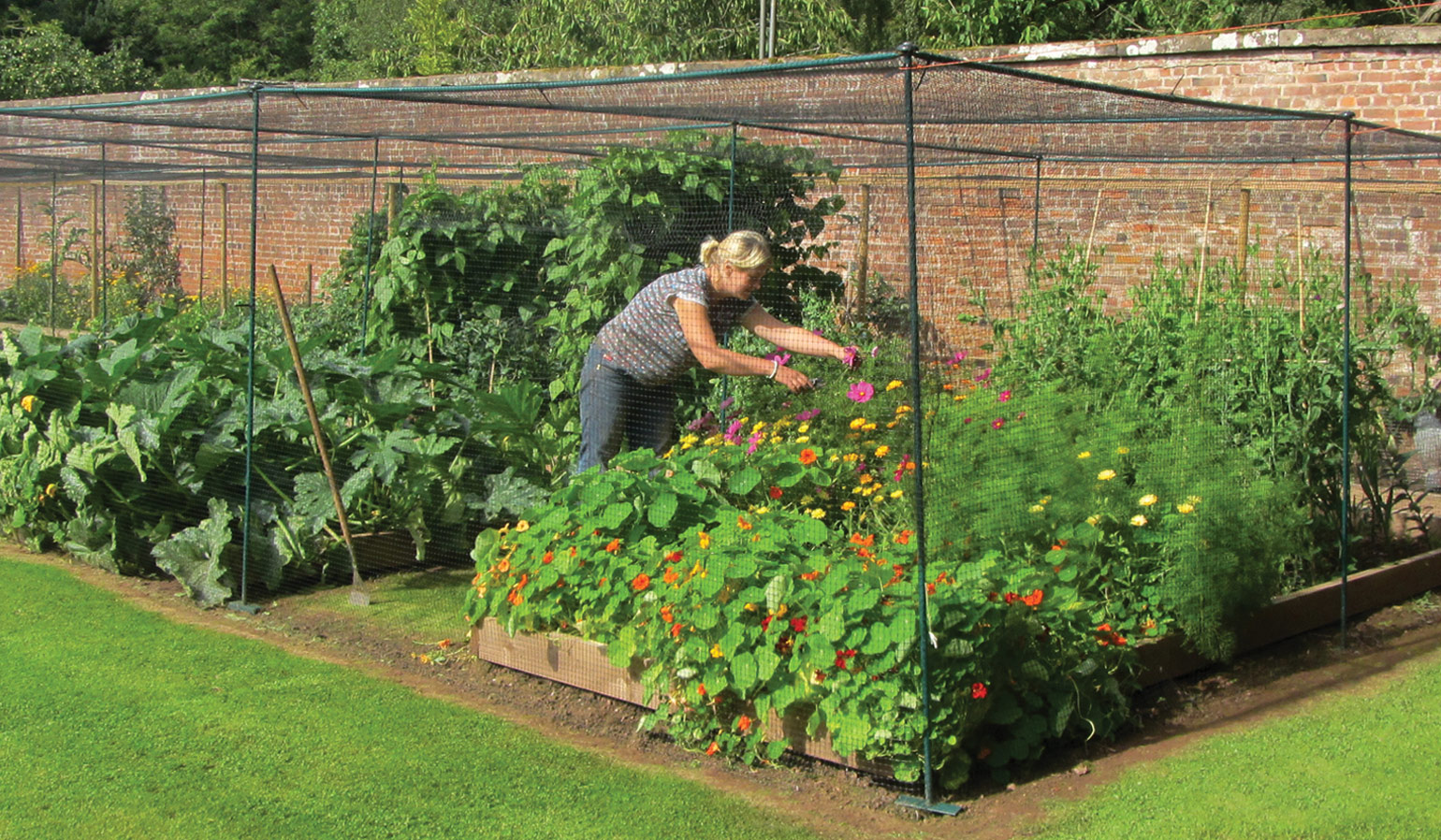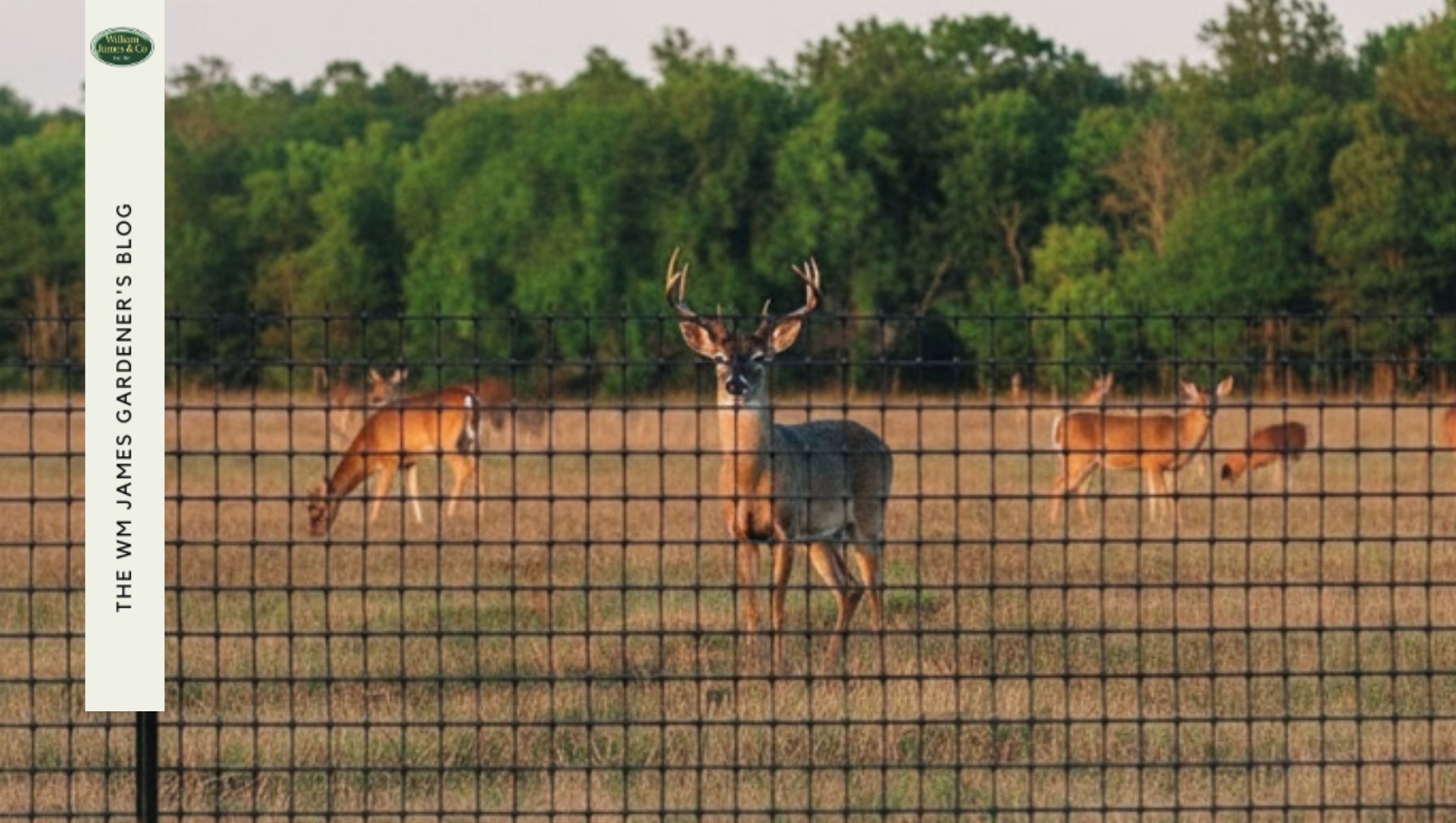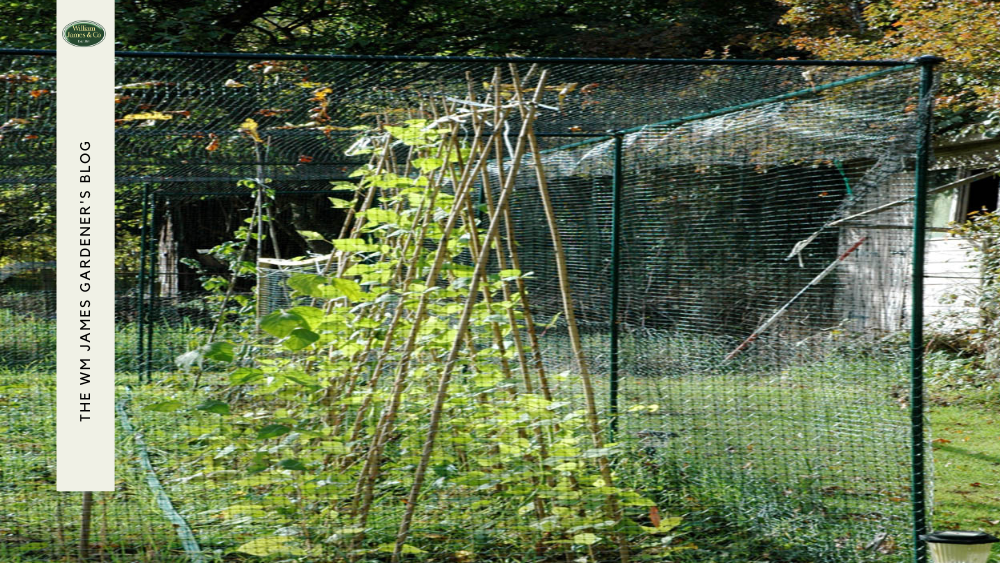We use cookies to make your experience better. To comply with the new e-Privacy directive, we need to ask for your consent to set the cookies. Learn more.
Everything You Need To Know About Buying a Fruit Cage
- Admin
- WM James Gardening Blog
- 12 Feb 2021
-
269views
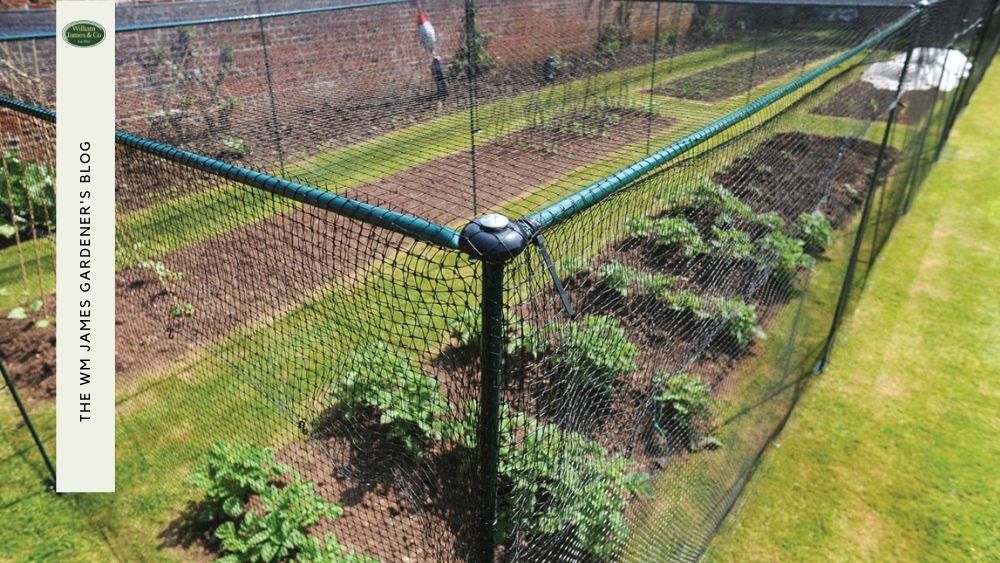
Buying a fruit cage can be daunting - especially when a quick look online brings up fruit cages in different sizes, materials and styles. If you're thinking about buying a fruit cage for your garden, then we're here to help.
We've been manufacturing top-quality cages in the UK since 1954, so our expertise knows no bounds when it comes down to fruit and vegetables.
In this post, we'll take you through what to look for in a good fruit cage and how to choose the right fruit cage based on your needs. Essentially, everything you need to know about buying a fruit cage, you'll find the answer right here in our guide.
Let's get started!
What Are Fruit Cages For?
Fruit cages are essential for protecting the fruit and vegetables you've worked hard to grow in your garden.
As well as preventing birds and animals, like deer and rabbits, from getting to your crops, fruit cages can create a perfect micro-environment for your crops to flourish.
Usually made from steel or aluminium poles, the fruit cage structure is covered with netting. The fruit cage netting is what protects your fruit from unwanted visitors.
Whether you're growing strawberries in the garden, grapes on a pergola or vegetables in the allotment, whatever fruits and vegetables you are growing, there will be a fruit cage for you.
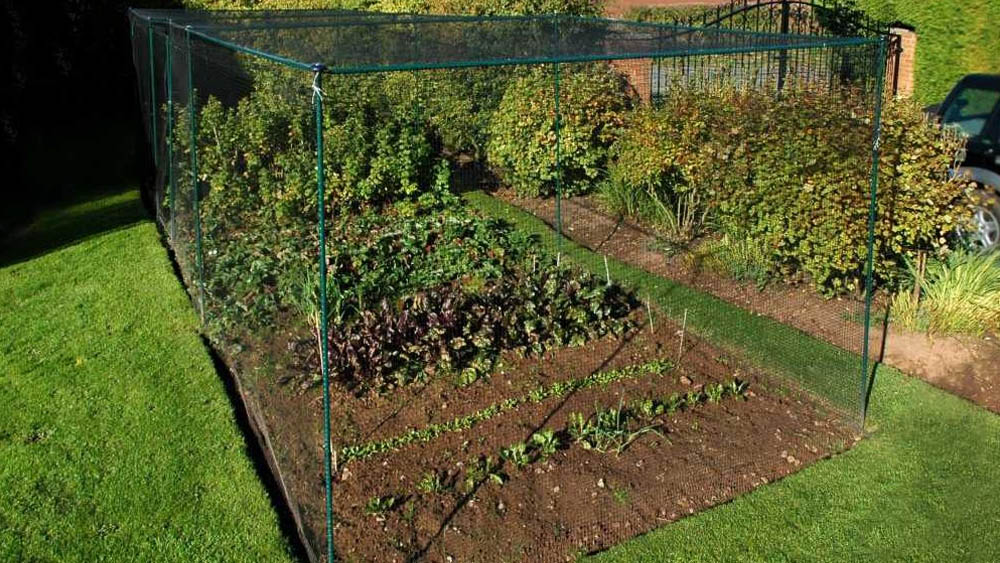
What's the Best Fruit Cage Frame Material?
Your choice of fruit cage frame material will be driven by two things mainly. How it looks and how long you want it to last.
Wooden Fruit Cages
Many people like the traditional look and feel of wooden fruit cages, and they blend in well with the natural surroundings. However, they tend to be more expensive to buy and need maintenance since they can be prone to rot.
Metal Fruit Cages
Metal fruit cages are a much more popular option because they last longer and are more sturdy than their wooden counterparts.
There are 2 types of metal fruit cages, which are...

Steel Fruit Cages
Steel fruit cages offer the option to go heavy-duty and long-lasting and, in our experience, is the top choice alongside aluminium.
Aluminium Fruit Cages
Aluminium, though lighter, is robust, durable and easier to erect and move around. It's a good choice for smaller gardens where the budget might be a bit of an issue.
If your location lacks shelter and is prone to high winds, steel will be resilient and last a long time. If you're in a sheltered spot, aluminium is a great choice and will last for many years.
At WM James & Co, we manufacture both steel and aluminium fruit cages, offering you a great choice of high-quality materials and sizes. Our cages are renowned for being long-lasting and easy to install. We also provide all the necessary equipment and accessories for installing or replacing parts of your cage, such as bird deterrents and netting, ground anchors and much more.
What Size Fruit Cage is Best?
Generally, the width and depth of a fruit cage will be determined by what plants and vegetables you want to grow and what type of animal or bird is likely to attack your crop.
To help with this decision, though, it's worth thinking about what access you'll need on either side of your fruit cages, for example, whether there are any fences, walls or buildings that might restrict the width of what you can install.
You'll need to consider what type of fruit you want to grow and what plants could be planted at the bottom. For example, strawberries are low-growing, but climbing peas can provide cover for your crop below.
The height of your fruit cage will be driven by how high your crops are likely to grow and whether you want full-height walk-in fruit cages or low fruit cages.
Harvesting and caring for your fruit trees is much easier if you don't have to crouch down each time you go in. And while the extra height will add to the cost, some quantity savings should be had.
A walk-in vegetable cage will also have a cage door, which will allow you to transport a wheelbarrow or other equipment in and out of the cage.

Best Fruit Cage Shape
A good shape to consider is a rectangle which will allow for more growing space without restricting your access. And with its four corners, this shape also allows you many options as to where it could be positioned on your plot and what direction it faces.
While many fruit cage suppliers offer you standard sizes, William James lets you build a fruit cage to your specs to match your plot size exactly. This will help you match your ideal length and width, but height is also an important consideration.
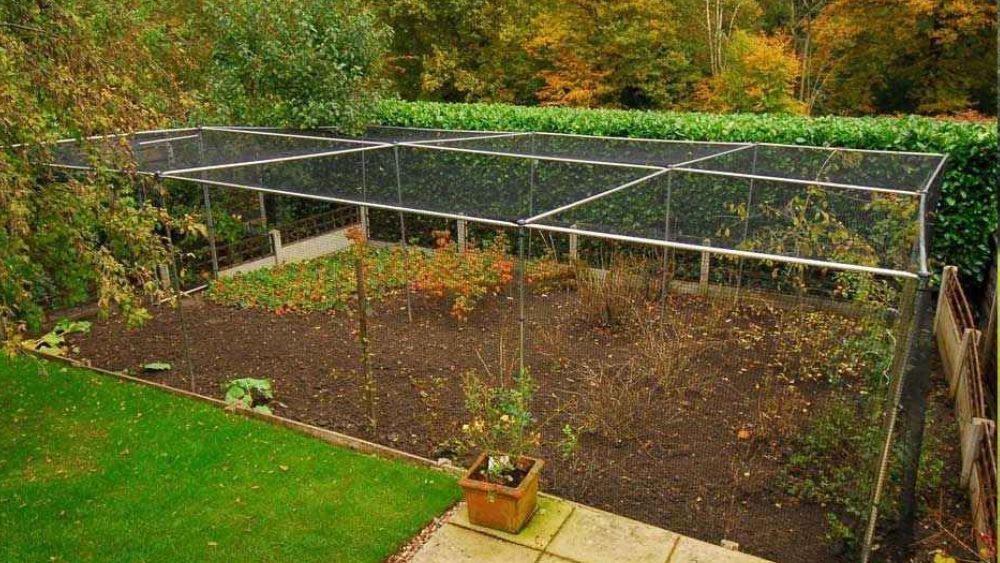
What is the Best Netting for Fruit Cages?
The choice of material for fruit cage netting and manufacturing quality is as important as deciding the frame material. The netting will take a lot of weather: wind, sun and rain, these being the main things that wear out fruit cage netting the fastest.
William James sells durable, rot-proof polyethylene netting, which weighs 80 gsm - more durable than other netting types, which often weigh in at 60 gsm. Our superior netting means replacing your netting less often and protecting your plants for longer.
When it comes to netting type, a knotted mesh is the most common way of manufacturing netting. However, a woven, knotless mesh (like the netting we manufacture) makes the net much softer to handle and more robust than its knotted counterpart.
A definite plus!
Choosing the Best Netting for a Fruit Cage
Estimating the overall square footage/meterage required for your fruit cage needs to be precise. You should allow for overlaps and wastage when you are cutting and fitting. You don't want to be too short in any areas that would leave gaps.
You don't need to worry about this when you buy a package deal that includes a fruit cage frame and net. We cut the netting to size for every order giving you peace of mind that your structure and netting match perfectly.
Fruit Cage Netting Mesh Size
Many people also ask, 'What size mesh for a fruit cage is appropriate?'. The answer depends on what you're protecting your fruit and vegetables from.
For example, a mesh size of 18mm will keep the majority of birds out. If you're concerned about larger animals, such as cats and foxes, a fruit cage with plastic mesh sizes no smaller than 20mm is what you should be looking for.
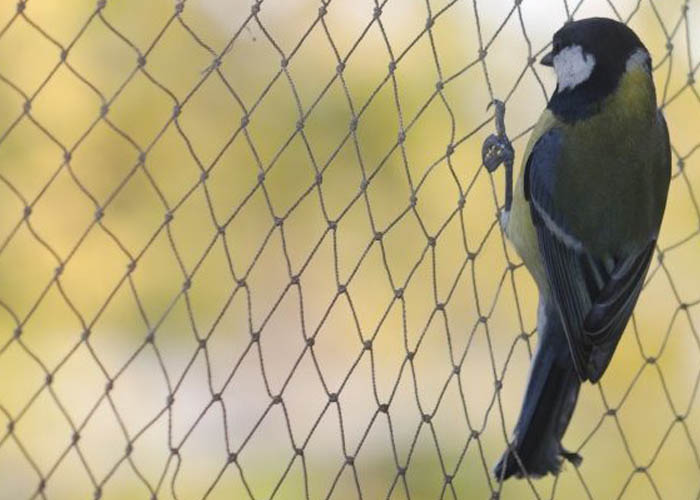
Fruit Cage Anti-Bird Netting Guide
As a general guide, we recommend the following fruit cage netting mesh sizes for birds.
- Sparrow – 19mm
- Starling – 28mm
- Pigeon – 50mm
- Gull – 75mm
Don't go too small, though. An 18mm mesh will still allow invaluable pollinating insects to pass through. If you need more help, take a look at our 'choosing the best garden netting' blog post for a more comprehensive look at choosing the best netting for your garden projects.
How to Build a Fruit Cage Kit
Together, fruit cage components can be bulky, so think ahead about where you want them delivered to and when.
Maybe you're planning to install your own cages at your allotment. If so, it makes sense to arrange for delivery to be made there.
Different materials will be harder/more straightforward to work with, e.g. screwing wood together vs slotting together metal poles. So plan for tools and timing required.
Metal fruit cages (steel or aluminium) are robust, sturdy and very simple to put up. The only tools you require are a stepladder, a screwdriver and a pair of sharp scissors! A second pair of hands may also prove useful.
Our fruit cages come with high-quality uprights and top rails, 360mm deep galvanised ground sockets or spikes and steel earth plates.
The William James mushroom cap jointing system makes them easy to fit together even on sloping or uneven ground. Useful add-ons to consider when buying a cage are cable ties, netting clips and ground pegs.
What Can I Grow in a Fruit Cage?
Most likely, you will have decided early on whether you're growing short or tall plants. Your yearly crop rotation plan will help you decide what gets planted where.
Salad crops and ground-level fruit like strawberries require low-level fruit cages around 0.5m high. If you're growing cabbages and other brassicas, use smaller gauge butterfly netting to keep cabbage butterflies at bay. For salads, bird netting is sufficient.
Tall fruit bushes such as raspberries and blackcurrants require a good 1.8 - 2.0m of upright growth space, so a walk-in fruit cage is the best solution.
Fruit Cage Maintenance Tips
A good quality fruit cage from a reputable supplier will last for many years. Steel fruit cages with powder coating finishes will need little or no maintenance, which is also true for aluminium cages and frames.
Good quality netting is UV stabilised, which minimises degradation. Side netting can be left in place all year, but top nets are susceptible to snow damage, so removal in winter is advisable. Regularly check for holes in the cages and repair them with a netting patch or net repair kit.
Always buy a fruit cage from a company that offers spare parts and make a note of a reliable netting supplier to replace and patch netting that is worn out or suffered a tear. We supply replacement fruit cage netting for all fruit cages, even if it wasn't originally bought from us.
With your fruit cage and netting in place, your produce is safe from predators and guaranteed to be in your mouth and not theirs.
Summary: A Guide to Fruit Cages from the UK's Fruit Cage Experts
Fruit cages can offer a fantastic way of keeping your fruits safe from predators and ensuring they are ready for harvest. Of course, you want to make sure that you're purchasing a fruit cage that's built to last and from a trusted, experienced manufacturer.
A fruit cage from William James & Co is definitely your best option. We're trusted by gardeners and allotments owners across the UK to deliver high-quality, durable fruit cages that are sure to last. And, we can provide you with netting for all fruit cages, even if it wasn't originally bought from us.
Explore our range today or get in touch if you have any more questions about our cages, or fruit cages in general - our team are happy to help!
FAQs
Are Fruit Cages Worth It?
Yes, fruit cages are brilliant if you're an avid home fruit and veg grower. They offer all-round protection for your crops and also add an element of interest to your green space.
What Fruits Grow in a Fruit Cage?
Essentially whatever fruit you want to grow, it'll grow in a fruit cage! Just ensure the cage you have is big enough to account for the crops, for example, if you're planting a fruit tree, you'll want the cage to be tall enough for the tree to grow freely.
What is the Best Position for a Fruit Cage?
Think about the crops you're growing: do they need full light or partial shade? Will they be damaged by strong winds? Your fruit and vegetable cages should be positioned so that the plants inside receive the necessary amount of sunlight and protection from the wind to ensure they have the best chance at thriving. Additionally, consider if you'll need access to the cage or not - placing it in a relatively accessible space might be wise.
What are the Benefits of a Fruit Cage?
The biggest benefit and main purpose of a fruit cage is to protect crops from predators that might cause damage to your plants, like birds, foxes and cats. Aside from that, they also give a sense of security and privacy, keep out harsh weather conditions, aid pollination by allowing bees to access the crops inside, and help you maintain good hygiene in your garden.



